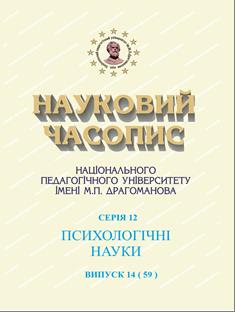DEVELOPMENT OF EMOTIONAL INTELLIGENCE OF FUTURE SPECIAL EDUCATION PROFESSIONALS
DOI:
https://doi.org/10.31392/NPU-nc.series12.2021.14(59).02Keywords:
special education, training of future specialists, emotional intelligence, intrapersonal and extrapersonal emotional intelligenceAbstract
Modern higher education reorientation to the paradigm of student-centeredness requires personal training content revision of future professionals. This problem acquires special significance in the framework of training future specialists in special education, where personal competence is one of the leading conditions for successful professional implementation. The complexity of personal training of a specialist in special education is that the list of important personal qualities of the teacher must correlate with the specifics of the nosology of the children with whom the teacher will work in future. Important qualities in the work of a future specialist in special education are tolerance, empathy, emotional stability, sensitivity to the emotional states of children, the ability to verbalize and convey their own emotions, to be able to encourage and inspire others. The combination of these qualities forms such complex phenomenon as the emotional intelligence of the future specialist. Emotional intelligence (EI) is a multicomponent phenomenon that integrates the intrapersonal and extrapersonal components. Emotional intelligence is in the TOP-10 leading soft skills that ensure the success of professional self-realization. The article highlights the theoretical analysis of approaches to understanding emotional intelligence in the psychological and pedagogical literature, presents the results of diagnosing the level of development of emotional intelligence of future specialists in special education by the “EmIn” test method of D. Lusin. A qualitative analysis of the peculiarities of the emotional intelligence development of future specialists in special education is given. It was found that the applicants for the specialty 016 Special Education without purposeful formation of emotional intelligence, in the vast majority, have a moderate and medium level of development of EI. The main directions of the training program content to develop emotional intelligence among future specialists of special education are presented in the article. The proposed program is determined to promote the development of the leading components of emotional intelligence (identification and differentiation of emotions, sensitivity and empathy for others), increases the emotional stability of applicants for the specialty 016 Special Education.
References
- Bondar, V.І. (2010). Inkliuzyvne navchannia ta pidhotovka pedahohichnykh kadriv dlia yoho realizatsii defektoloha [Inclusive education and training of pedagogical staff for its implementation by a speech pathologist]. Naukovyy chasopys NPU imeni M.P. Drahomanova. Seriya 19. Korektsiyna pedahohika ta psykholohiya – Scientific journal of National Pedagogical Dragomanov University. Series 19. Correctional pedagogy and psychology, 15, 39–42 [in Ukrainian].
- Bondarchuk, O.І. (2012). Psykholohichna kompetentnist fakhivtsia: zmist ta osnovni pidkhody [Psychological competence of a specialist: content and basic approaches]. Naukovyi visnyk Mykolaivskoho derzhavnoho universytetu imeni V.O. Sukhomlynskoho: Zbirnyk naukovykh prats’. Seriya “Psykholohichni nauky” – Scientific Bulletin of Mykolayiv State University named after V.O. Sukhomlynsky: Collection of scientific works. Psychological Sciences Series, 8, 30–36 [in Ukrainian].
- Mamicheva, O. (2011). Psykholohichni aspekty formuvannia profesiinoi stiikosti defektoloha [Psychological aspects of formation of professional stability of the defectologist]. Naukovyy chasopys NPU imeni M.P. Drahomanova. Seriya 19. Korektsiyna pedahohika ta spetsial’na psykholohiya – Scientific journal of National Pedagogical Dragomanov University. Series 19. Correctional pedagogy and special psychology, 19, 297–301 [in Ukrainian].
- Liusin, D.V., & Ushakov, D.V. (2004). Sotcialnyi intellekt: Teoriia, izmerenie, issledovaniia [Social Intelligence: Theory, Measurement, Research]. Moscow : In-t psikhologii RAN [in Russian].
- Synov, V.M. (2007). Modernizatsiia pidhotovky fakhivtsiv v haluzi korektsiinoi osvity v Ukraini [Modernization of training of specialists in the field of correctional education in Ukrainі]. Teoretychni ta metodychni zasady rozvytku pedahohichnoyi osvity: pedahohichna maysternist’, tvorchist’, tekhnolohiyi: zbirnyk naukovykh prats’ – Theoretical and methodical bases of development of pedagogical education: pedagogical skill, creativity, technologies: collection of scientific works, 267–270 [in Ukrainian].
- Shulzhenko, D.І. (2009). Osnovy psykholohichnoi korektsii autystychnykh porushen u ditei [Fundamentals of psychological correction of autistic disorders in children]. Kyiv : Slovo [in Ukrainian].
- Bar-On, R. (2011). Emotional Intelligence: An Integral Part of Positive Psychology. South African Journal of Psychology, 40(1), 54–62.
- Salovey, P., & Mayer, J.D. (1990). Emotional intelligence. Imagination, cognition and personality, 9(3), 185–211.

